The Sports Report Olympics Edition: Trying to ‘imagine’ a normal Games
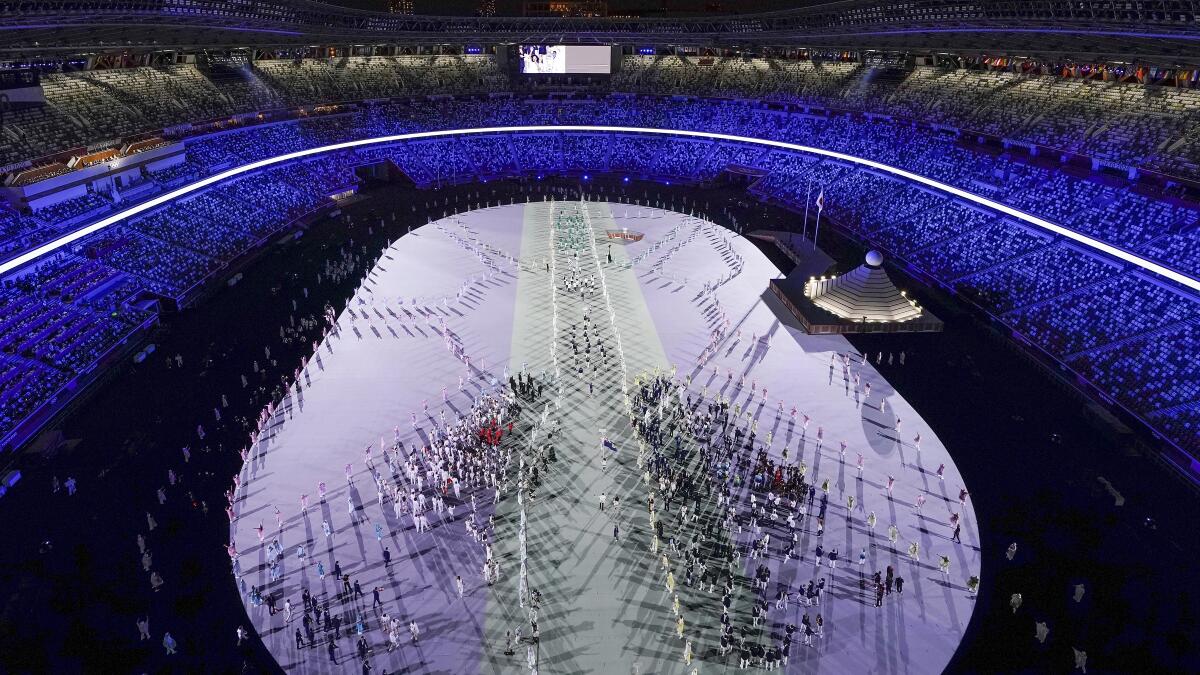
- Share via
TOKYO — Good morning everyone, it’s Dan Woike here with today’s Olympics newsletter, written live from a mostly empty Olympic Stadium.
Before we dive into what it was like to see the opening ceremony from a seat four rows off the floor, here’s the big stuff that you need to know today:
Friday and Saturday TV schedule
Olympic athletes results tracker
‘Olympic grandmas’ looking to become Tokyo golden girls
Tokyo Olympics will forever be Pandemic Games
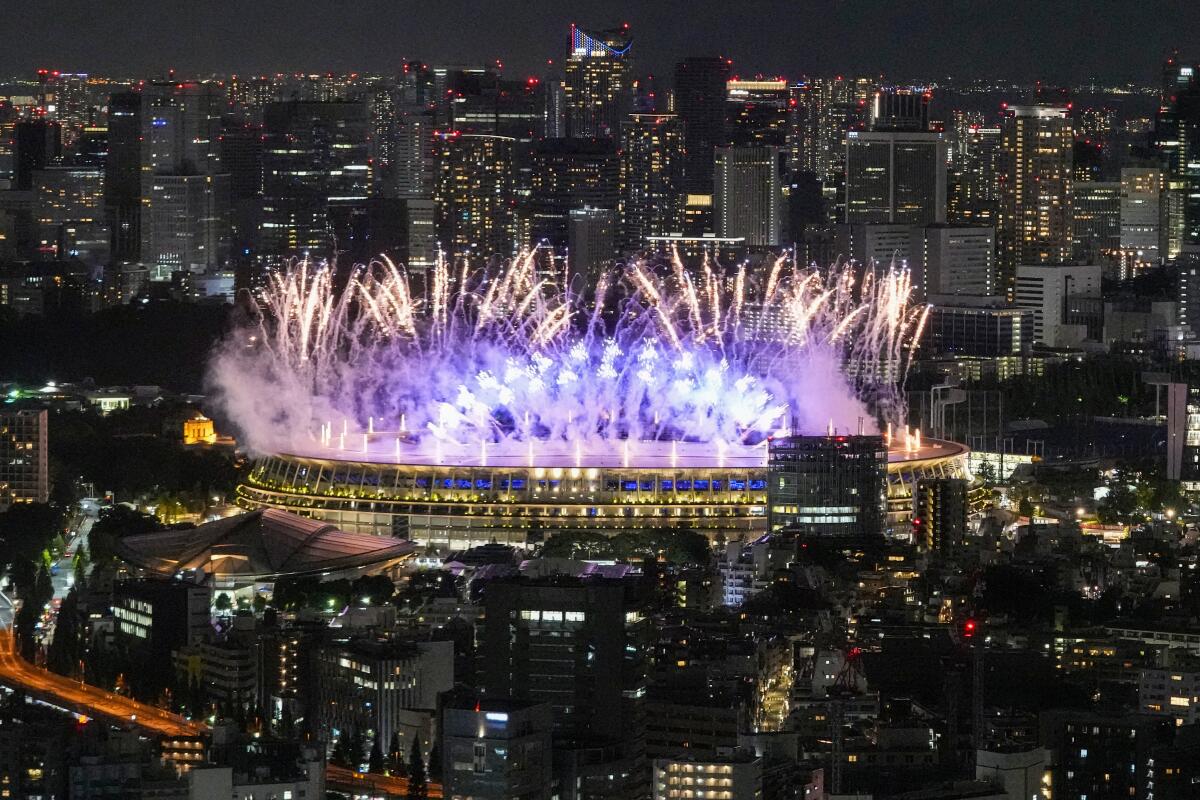
OK, so back the opening ceremony, the time when this thing formally gets under way, is usually about the host country welcoming everyone, celebrating its culture and rewarding the participants with a memory that lasts a lifetime.
Instead, this feels sort of like taking the tour at Dodger Stadium with the team on the road. But the cameras are here, pointed at the spectacle, kind of hoping that it’ll trick the viewers into forgetting the reasons why these Games are the way they are.
At one point during the ceremony, John Lennon’s “Imagine” played, the irony being that it’s not hard to imagine how this could’ve been a much better situation. More vaccines, more adherence to rules, nimbler reactions, better luck — any of it would’ve allowed these Games to provide the people here to better enjoy Tokyo and its sights. But the sounds of protest from outside the stadium during the opening ceremony served as a reminder to how controversial the decision has been to move forward with the Games.
Go beyond the scoreboard
Get the latest on L.A.'s teams in the daily Sports Report newsletter.
You may occasionally receive promotional content from the Los Angeles Times.
For now, the most striking scenery is the gaze pointed down at the saliva vials, a daily ritual during the first week before it gives way to twice-a-week screenings for the media.
This will be the test of these Games — just like it was the test of sports throughout the pandemic. Undoubtedly, the Lakers and Dodgers’ championships were lessened because no one was there to celebrate, to pump oxygen into the tensest moments of those titles.
I was in Orlando for the NBA Finals, and after Game 1, I wrote that it just didn’t feel special enough. I didn’t feel that way by the end of the bubble, but maybe I was just conditioned by then. We’ll see if that happens here.
As our bus pulled up to the stadium Friday afternoon, we saw some locals milling around the Olympics museum, posing for photos in front of the Olympic rings and staring at the hordes of media who decided to come see if Japan could pull this all off.
With the sun slowly setting and the show inching closer to beginning, the in-building speakers played the first official music of these Games.
The notes of “I’ve Got You Under my Skin” filled the emptiness of the building, echoing off seats that are empty because of the virus-filled undercurrent that postponed these Games before and defines them now.
The state of flag bearing

I liked how Jorge Castillo wrote about an idea I’ve had for years — that every baseball team should have a fast guy Olympian to fly around the bases. In this case, though, that guy, Eddy Alverez, will also be the U.S. flag bearer for the opening ceremonies alongside WNBA legend Sue Bird.
I love Alvarez’s story for a bunch of reasons. The Olympics reward specialized athletic skills more often than not and it’s incredible that someone was able to get here twice in two totally unrelated disciplines – baseball and speedskating.
That’s the biggest.
Another reason I enjoyed it? In some subsequent research, I found out Alvarez is just the third Floridian to carry the flag while seven Californians have had the honor (most recently it was ex-USC star Bryshon Nellum in 2012).
Sad to report that New York has produced the most flag bearers. They’ve had 10. Surprised there hasn’t been a Daily about it yet.
Ink or swim
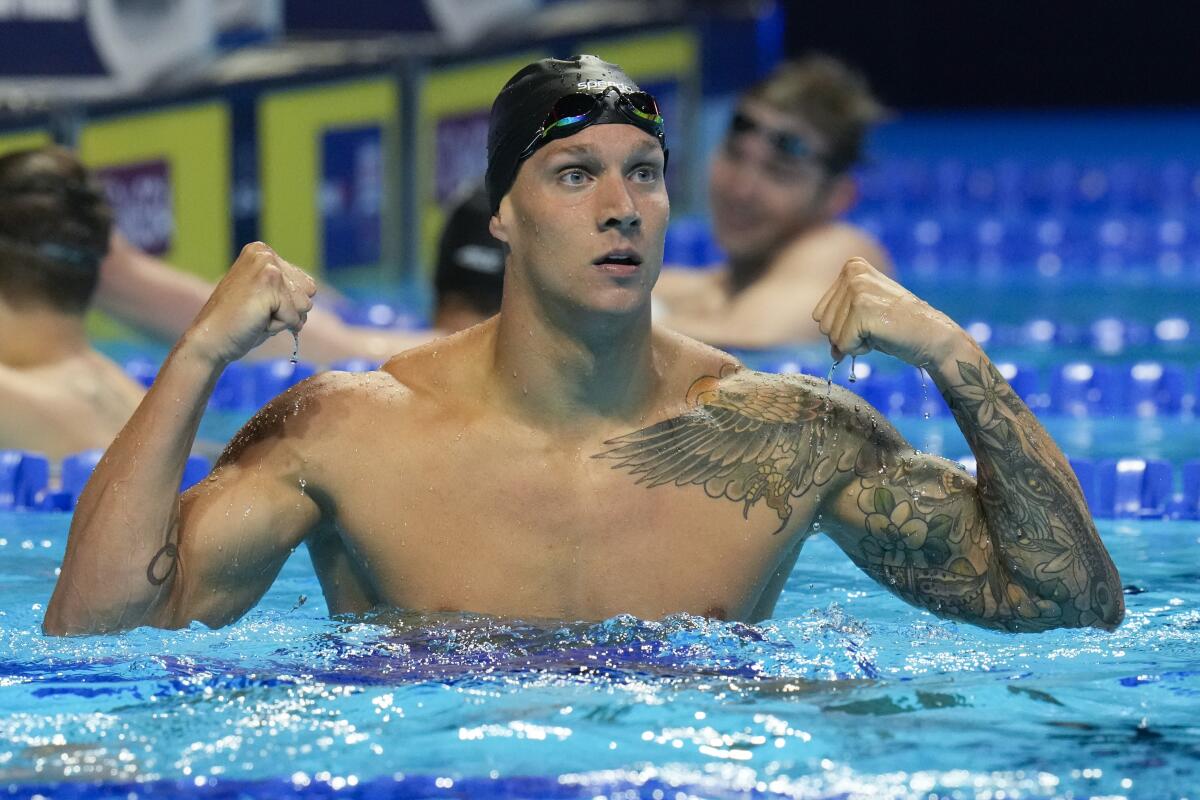
A wonderfully descriptive lede about Caeleb Dressel’s tattoos kicked off Nathan Fenno’s story about America’s best hope for Michael Phelps-esque dominance.
I also loved this quote:
“When I watch Caeleb, there’s kind of a violence to the way he swims above water, but a grace and efficiency and beauty to the way he swims underwater,” said Russell Mark, USA Swimming’s national team performance manager. “The violence above water is a high tempo. … And underwater, he uses whole body, an amazing, elegant motion.”
The violence when I swim is me thrashing my way away from death’s dark door. (My mother has described my freestyle stroke as “not drowning.”)
COVID-19 update
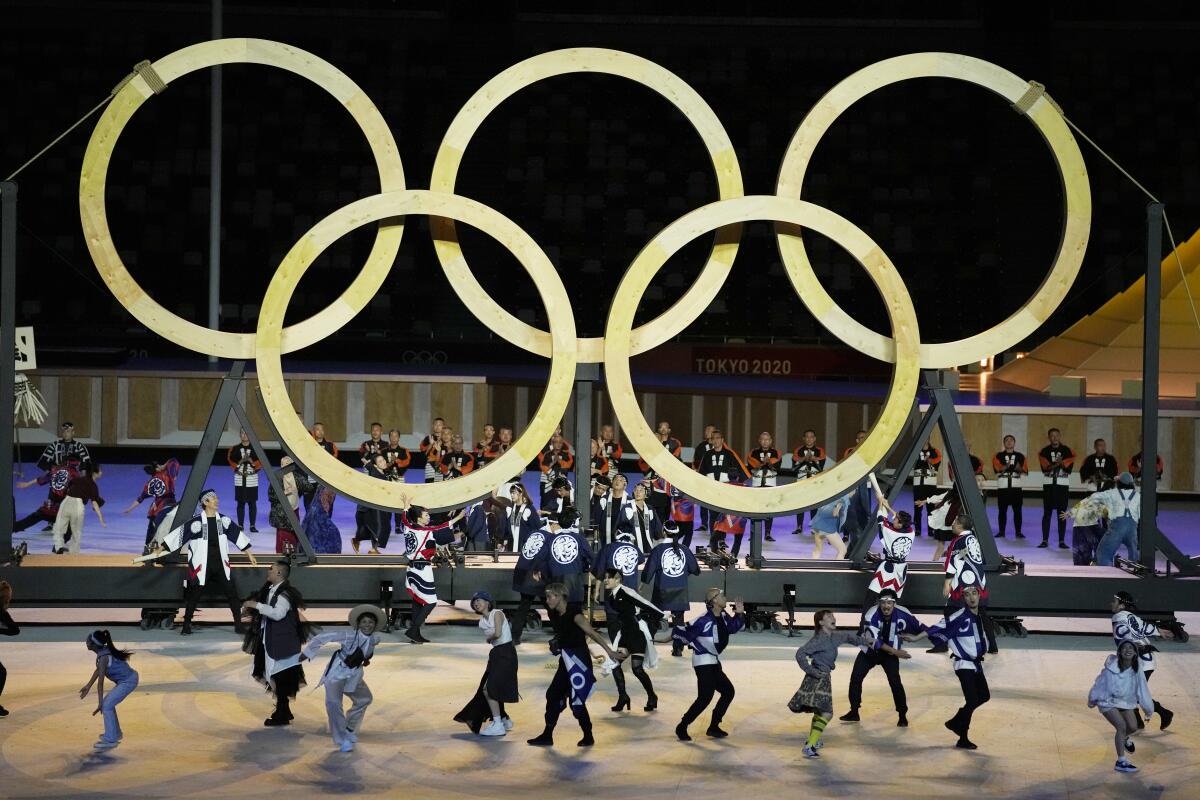
The first record has fallen at these Olympics, with the IOC reporting 19 new positive results for COVID-19.
Three athletes, 10 Games personnel, three media members and three contractors all registered positive tests — the most since the organization has been tracking these numbers since July 1.
There have been 106 positives since the start of the month inside the Olympics community, including 11 athletes.
Golden Olympic grandmas
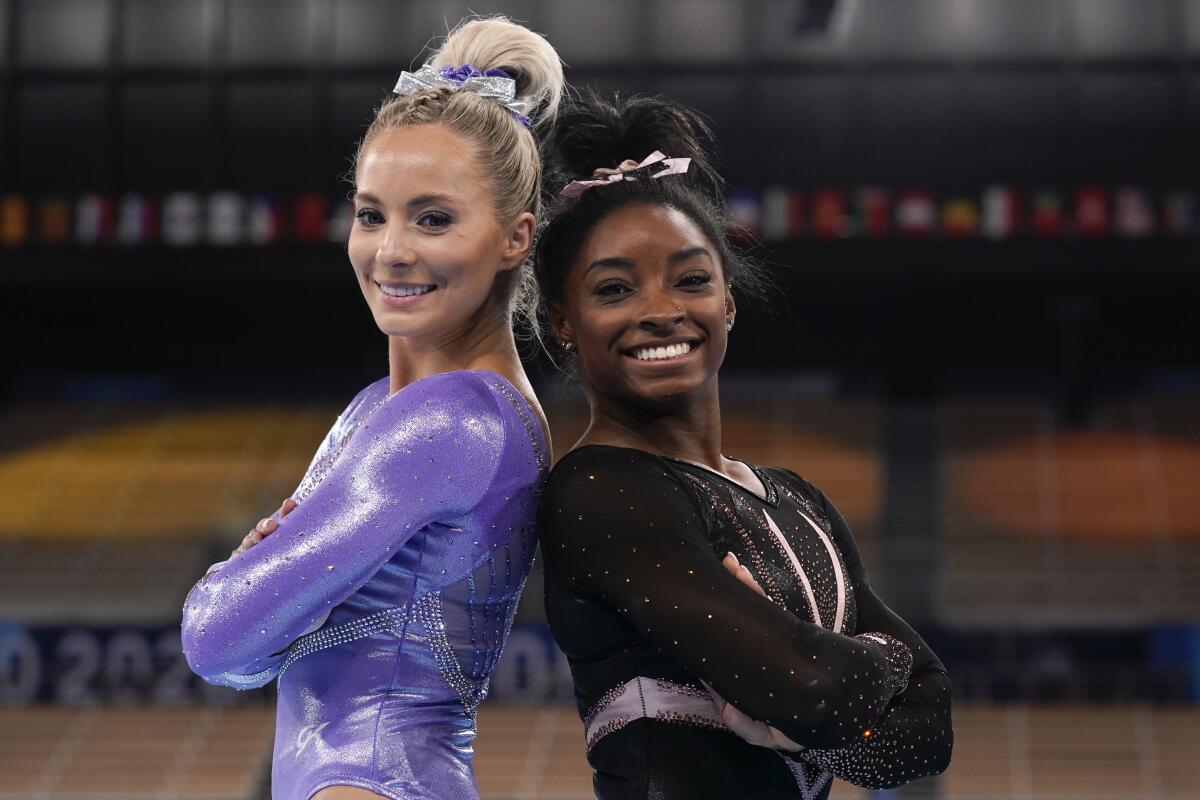
Columnist Helene Elliott on the U.S. Olympic women’s gymnastics team: The competition floor stretched out behind them and tantalizing possibilities danced in front of them as MyKayla Skinner and Simone Biles smiled for the cameras on Thursday at Ariake Gymnastics Centre. On Sunday, when team qualifying takes place, they will be tumbling and twisting and flying toward medals at the Olympic Games. First, they paused to celebrate the moment, standing back to back in mirrored poses.
The caption Biles chose when she launched the photo into the social media world was surprising: “Little did you know OG means Olympic Grandma’s.”
These “grandmas,” both 24, are not the only medal contenders competing at an age once considered elderly in the sport. Compared to 46-year-old Oksana Chusovitina, who’s extending her own gymnastics Olympics appearance record to eight, Biles and Skinner are kids.
Chusovitina, who won team gold in 1992 with the Unified Team and silver in the vault in 2008 while representing Germany, has hinted at retirement before. She vowed these will be her final Games because she wants to spend more time with her son Alisher, who will be 22 in November. “She feels very good. Very happy that this is her last Olympics. At same time she feels good, she feels bad,” a translator said about Chusovitina’s emotions.
A sport that once put a premium on the acrobatics of tiny, teenaged sprites has become more welcoming to women who are in their 20s, and it’s refreshing. Energy and difficult tricks are entertaining, but there’s a lot to be said for the maturity an “older” gymnast can bring to a performance.
Enjoying this newsletter? Consider subscribing to the Los Angeles Times
Your support helps us deliver the news that matters most. Become a subscriber.
Pandemic Games in Tokyo

Columnist Dylan Hernández on the Olympics: At this point, the Tokyo organizing committee is the bureaucratic equivalent of the Titanic’s orchestra, its members figuratively continuing to play their instruments even as the hopelessness of their situation has come into focus.
They look exhausted.
They sound defeated.
“As the person in charge of the organizing committee that caused numerous scandals,” president Seiko Hashimoto said in Japanese, “I feel painfully responsible.”
And the opening ceremony hasn’t even taken place yet.
The Pandemic Games have barely started, but they are already a full-scale public-relations disaster.
Triumph and tragedy
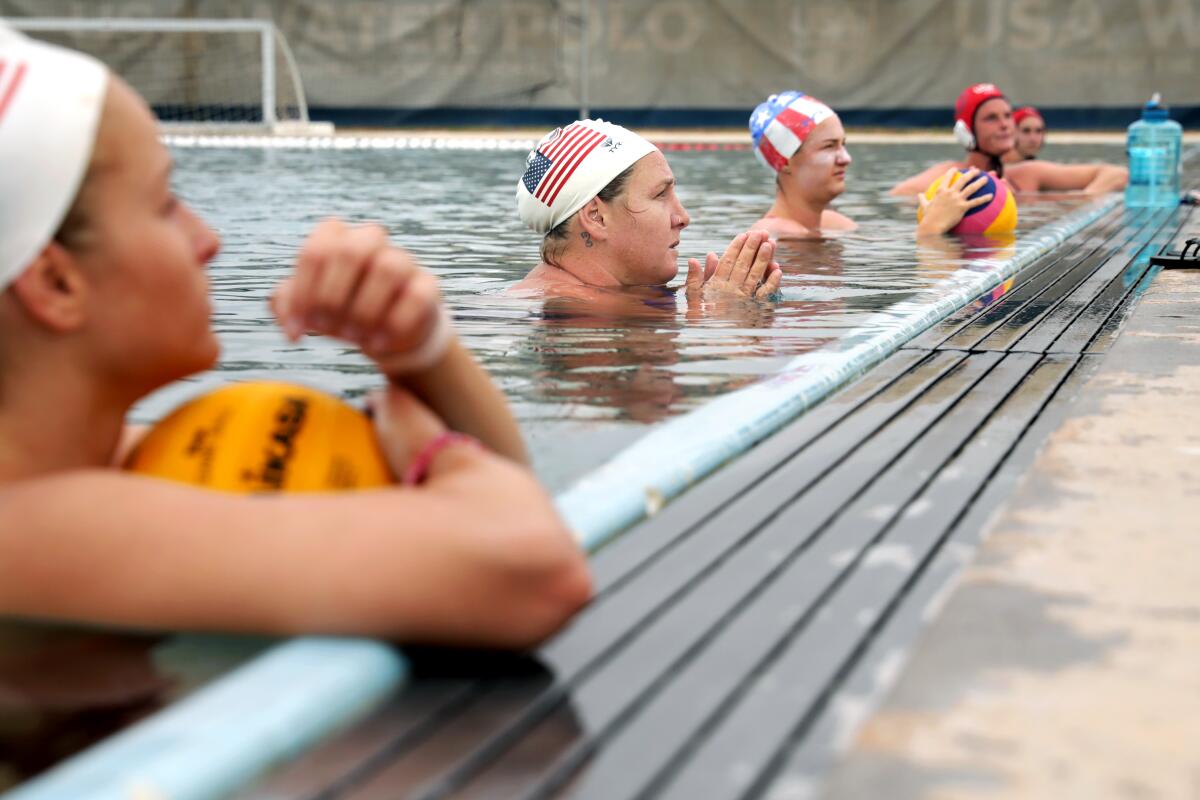
Kevin Baxter on U.S. women’s water polo: There were deaths, near deaths and gruesome injuries.
There was a mass shooting in Las Vegas, a nightclub collapse in South Korea and a terrorist bombing at a train station in Belgium. And all that happened before COVID-19 put everyone’s life on hold for a year.
The last five years have been a series of tragedies and triumphs for the women on the U.S. water polo team, experiences coach Adam Krikorian insists have prepared them for winning an unprecedented third consecutive Olympic title in Tokyo, a quest that starts Saturday when the U.S. plays Japan.
“It feels like this is the way it was supposed to happen,” he said. “Every time any one of us deal with some adversity and challenges, as painful or as sad as it can be, we do look at it as an opportunity to grow and to be better.
“Embracing that, we’ve accepted it as part of our journey and, in some ways, of a greater purpose.”
If that makes it a team of destiny, it’s one Krikorian and his players have paid for with enough blood, sweat and especially tears to fill an Olympic-sized swimming pool.
It started shortly after the team arrived in Rio de Janeiro for the last Olympics when Krikorian got a text from home informing him that his brother Blake had died of a heart attack at 48. The coach left the team and booked a 12-hour flight to San Francisco. He briefly considered staying there but returned to Brazil where, hours before the first game, he learned the mother of defender Melissa Seidemann had suffered a stroke and was in a Rio hospital.
Friday and Saturday TV schedule
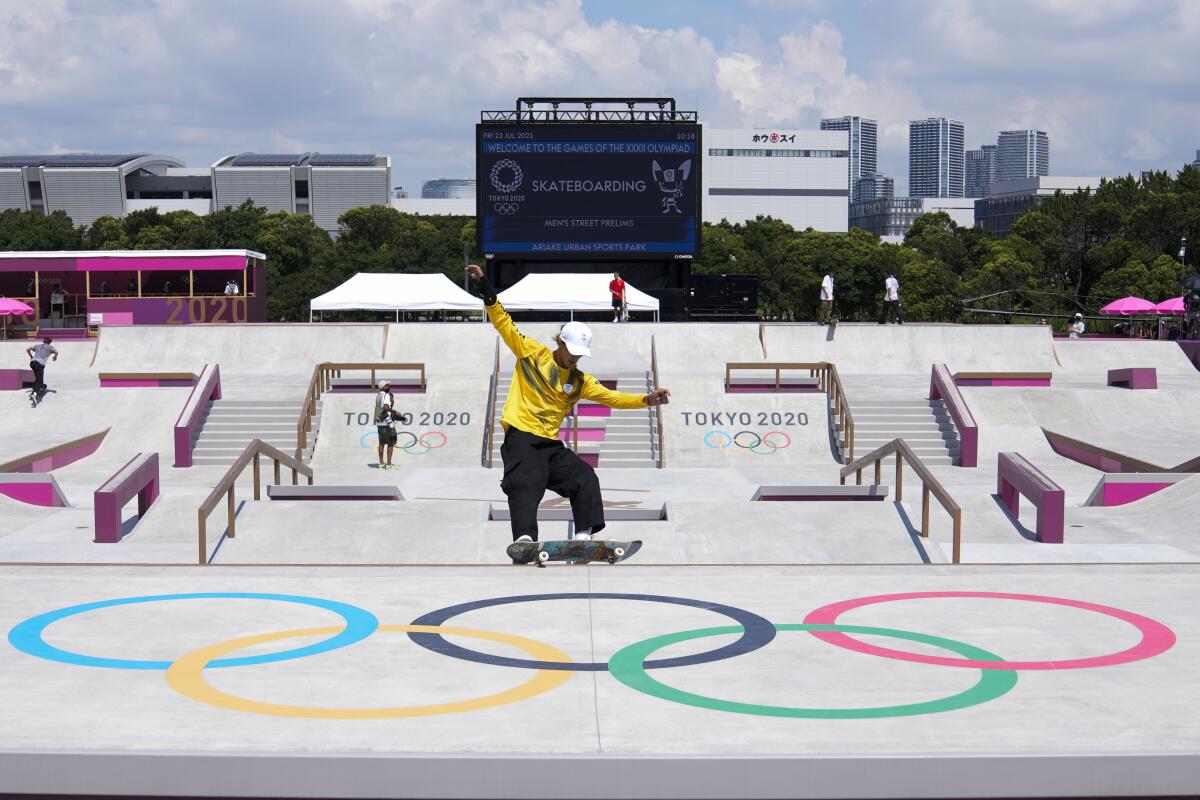
Here’s a rundown of Olympic events on television Friday and Saturday. All times PDT; includes both live and delayed or replayed broadcasts.
FRIDAY
Opening ceremony
Live coverage: 3:55 a.m.–8 a.m., NBC, NBCOlympics.com
Expanded prime-time coverage: 4:30 p.m.-9 p.m., NBC
Friday night encore: 9:10 p.m.-1:10 a.m., NBC
Saturday morning replay: 2:13 a.m.–5 a.m., NBC
Cycling
Men’s road race, 4:30 p.m.-11 p.m., USA (live)
Multiple sports — 9 p.m.-11 p.m., NBCSN
- 3-on-3 Basketball (multiple games)
- Archery — Mixed team elimination rounds
- Women’s water polo — U.S. vs. Japan (live)
Rowing
Qualifying heats & repechages, 4:30 p.m.-11 p.m., USA (live)
Men’s soccer
Japan vs. South Africa, 1 a.m., NBCSN (replay)
Brazil vs. German, 3 a.m., NBCSN (replay)
Women’s soccer
China vs. Brazil, 10:30 a.m., NBCSN (replay)
Japan vs. Canada, 12:30 p.m., NBCN (replay)
U.S. vs. Sweden, 2:30 p.m., NBCSN (replay)
Softball
5 a.m.-10:30 a.m.
- U.S. vs. Italy, NBCSN (replay)
- U.S. vs. Canada, NBCSN (replay)
Tennis
Men’s and Women’s Singles, Doubles — First round, 7 p.m., Olympic Channel (live)
SATURDAY
Multiple sports — 11 p.m. Friday-6:50 a.m., USA
- Men’s cycling — road race
- Women’s beach volleyball — qualifying round
- Rowing — qualifying heats and repechages
- Swimming — qualifying heats
- Men’s beach volleyball — qualifying round
- 3-on-3 basketball
Multiple sports — 11 p.m. (Friday)-4:30 a.m., NBCSN
- Women’s water polo: U.S. vs. Japan (live)
- Softball: U.S. vs. Mexico (live)
- Archery — Mixed team final (live)
- 3-on-3 basketball
- Women’s soccer — Sweden vs. Australia (live)
- Men’s handball — France vs. Argentina (live)
Multiple sports — 3 a.m.-8 a.m., Peacock
- Men’s gymnastics — Qualifying (live)
- Men’s volleyball — U.S. vs. France (live)
Multiple sports — 6:30 a.m.-5 p.m., NBCSN
- Women’s soccer — Netherlands vs. Brazil
- Table tennis — Elimination round
- Equestrian — Dressage
- Badminton — Qualifying round
- Men’s handball — Denmark vs. Japan
- Beach volleyball — Qualifying round
- Men’s volleyball — U.S. vs. France
Multiple sports — 7 a.m.-5 p.m., USA
- Women’s water polo — China vs. Russian Olympic Committee
- Beach Volleyball — qualifying round
- Men’s Handball — Germany vs. Spain
- Fencing — Men’s sabre & women’s epee finals
- Shooting — Women’s air rifle
- Weightlifting — Women’s final
- Boxing — Elimination rounds
- Judo — Finals
- Taekwondo — Finals
- Table Tennis — Elimination round
- Women’s soccer — U.S. vs. New Zealand
- Multiple sports — 5 p.m.-11 p.m., USA
- Skateboarding — Men’s Street Qualifying (live)
- 3-on-3 basketball (live)
- Archery — Women’s team elimination round
- Skateboarding — Men’s street final (live)
- Cycling — Women’s road race (live)
Multiple sports — 7:45 a.m.-11:45 a.m., NBC
- 3-on-3 basketball — U.S. vs. France
- Women’s water polo — U.S. vs. Japan
- Rowing — qualifying heats
- Archery — mixed team final
- Cycling — men’s road race
Multiple sports — 11:45 a.m.-3 p.m., NBC
- Swimming — qualifying heats
- Men’s beach volleyball — qualifying round
- Men’s gymnastics — team competition
Multiple sports — 5 p.m.-8:30 p.m., NBC
- Women’s beach volleyball — qualifying round
- Men’s gymnastics — team competition
- Swimming final — men’s 400 IM, men’s 400 freestyle, women’s 400m IM, women’s 4x100 freestyle relay
- Skateboarding — men’s street qualifying
Multiple sports — 5 p.m.-10 p.m., CNBC
- 3-on-3 basketball — U.S. in qualifying round
- Softball — U.S. vs. Australia (live)
- Rowing — Qualifying heats
- Table Tennis — Mixed doubles quarterfinal
Multiple sports — 5 p.m.-11 p.m., NBCSN
- Women’s water polo — U.S. vs. Japan
- Beach volleyball — Men’s qualifying round
- Men’s volleyball — U.S. vs. France
- Softball — U.S. vs. Australia
Multiple sports — 8:30 p.m.-11 p.m., NBC
- Skateboarding — Men’s street final
- Women’s volleyball — U.S. vs. Argentina
Men’s skateboarding
Street final, 8:30 p.m., NBC (live)
Women’s soccer
U.S. vs. New Zealand, 4:30 a.m. (live)
Tennis
First round men’s singles, women’s singles, doubles (live), 11 p.m. Friday; Olympic Channel
Men’s volleyball
U.S. vs. France, 6 a.m., NBC (live)
Men’s water polo
U.S. vs. Japan, 10 p.m., CNBC
Olympic athletes tracker
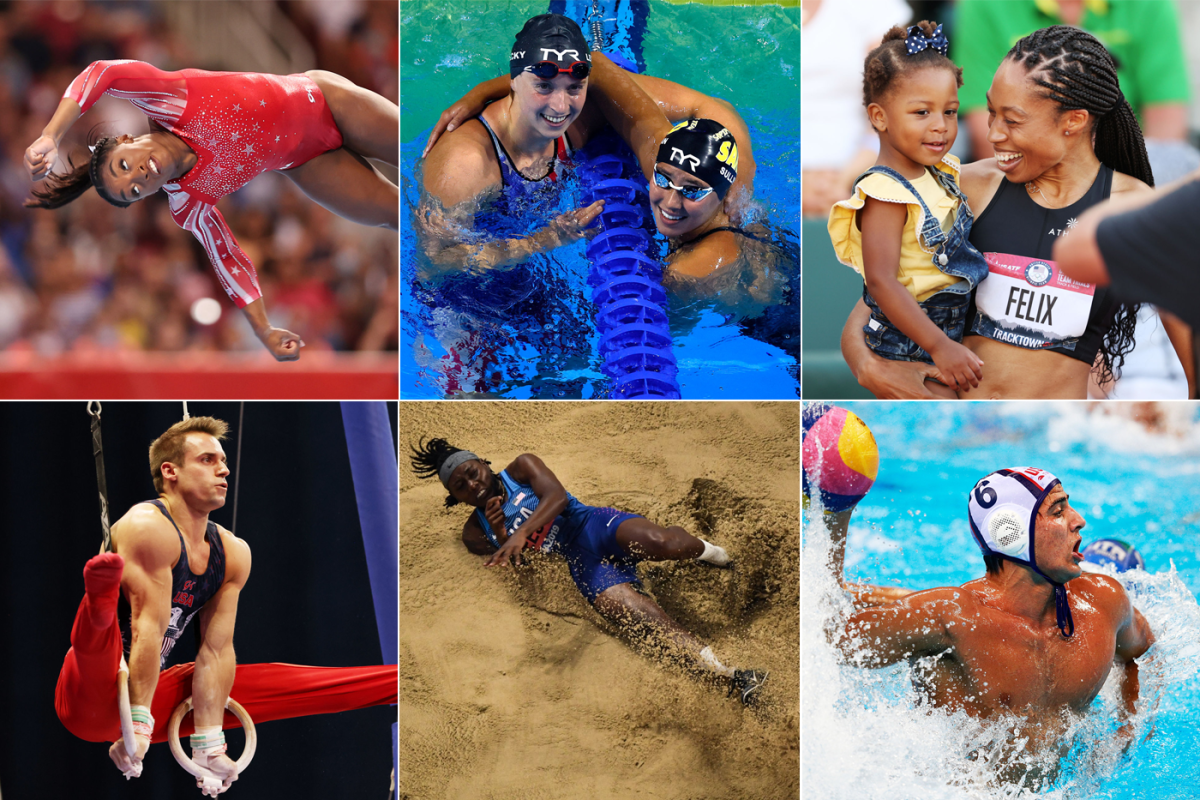
A total of 613 athletes, including 55 gold medalists, will represent the United States at the Olympics, with dozens hailing from cities and towns in the Greater Los Angeles and San Diego areas. Track every athlete’s progress here.
And finally
Protestors gathered outside Olympic Stadium in Tokyo during the opening ceremony. Check out the video here:
Until next time...
That concludes today’s newsletter. If you have any feedback, ideas for improvement or things you’d like to see, email us at [email protected]. To get this newsletter in your inbox, click here.
Go beyond the scoreboard
Get the latest on L.A.'s teams in the daily Sports Report newsletter.
You may occasionally receive promotional content from the Los Angeles Times.




